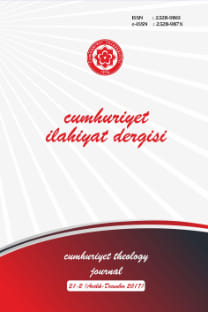MATÜRİDİ’YE GÖRE HİDAYETE ENGEL OLAN BEŞERÎ ZAAFLAR VE TEZAHÜRLERİ
Kelâm ilminin ana konularından olan hidayet, Allah ve kulun iradesi sonucu oluşmaktadır. Hidayetin gerçekleşmesi, kelâm ekolleri arasında tartışma konusu olmakla birlikte, bu oluşumda bazı psikolojik faktörlerin etkisi genel bir kabuldür. Kur'an’da bu etkenler belirtilirken, hidayete engel olan sapmalar da, önemle vurgulanmıştır. Ehl-i Sünnet imamlarından Mâtüridî, bu manileri kelâm verileri çerçevesinde özenle yorumlamıştır. Daha çok beşerî bağlamda değerlendirilen hidayet engelleri, imanın mahalli olan kalbin fonksiyonlarına müdahale etmektedir. Kur'an ifadeleri ve Mâtüridî’nin yorumları çerçevesinde ele alınan, hidayete mâni olan beşerî-aklî sapmaların direkt kalbe yansıması, bir anlamda inanç konularındaki akılkalp ilişkisine göndermede bulunmaktadır.
Anahtar Kelimeler:
Kur’an, Matürîdî, hidayet, insanî zaaflar, akıl-kalp ilişkisi
Human Weaknesses and Their Appearences Hindering Divine Guidance in tne Opinion of Maturidi
Guidance, one of the major themes of Islamic Theology, is established in accordance with the result God and man’s will. Although there are disputes in the constitutions of guidance among the Schools of Islamic Theology; it is generally accepted that the psychological plays important role in its constitution. Though the Qur’an states these effects, it also deals with some distractions, which prevent the people from guidance. The great scholar of Muslim Orthodoxy (ahl al-sunnah), alImam al-Maturidi, comments on these obstacles sensitively in the context of Islamic theology. These obstacles to guidance are dealt with in rational context, however they also interfere clearly the place of belief, qalb (heart). The obstacles to guidance (rational obstacles which is reflected in the heart of believers) which are dealt with from the perspectives of Qur’anic statements and Maturidi’s interpretations makes clear references to the relationship between the reason and heart concerning the issues about belief.
- ISSN: 2528-9861
- Yayın Aralığı: Yılda 2 Sayı
- Başlangıç: 1996
- Yayıncı: Cumhuriyet Üniversitesi İlahiyat Fakültesi
Sayıdaki Diğer Makaleler
MATÜRİDİ’YE GÖRE HİDAYETE ENGEL OLAN BEŞERÎ ZAAFLAR VE TEZAHÜRLERİ
İFK OLAYI ÜZERİNE BİR DEĞERLENDİRME (Sebep ve Sonuçları Açısından)
VİÂEYN RİVÂYETİ VEYA EBÛ HUREYRE’NİN ÖLÜMÜNE SEBEP OLABİLECEK GİZLİ BİLGİLER
TÂİF İLE İLGİLİ BAZI MÜLAHAZALAR
HZ. PEYGAMBER'İN EĞİTİMİNDE BİR İLKE OLARAK HOŞGÖRÜ
SÜLEYMAN NAZİF’E GÖRE İRAN EDEBİYATININ EDEBİYATIMIZA TESİRİ
DİNİ İÇERİKLİ EKONOMİK BİR KAVRAM: HUMS (İslâm Öncesi Mekke’nin Ticari İlişkileri Yönüyle)
